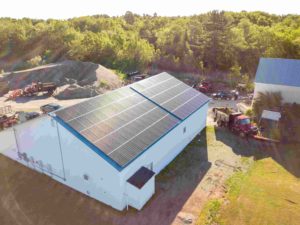15 Nov Bonus Depreciation for Commercial Solar Energy Systems
 There were some big changes that were made at the end of 2017 that impact the tax benefits available to businesses that purchase and install a solar energy system. Under the “Tax Cuts and Jobs Act,” Congress doubled the amount of bonus depreciation that can be claimed for commercial solar energy projects. Businesses can now apply 100% depreciation for the expense of a solar panel system in year 1 instead of spreading it out over 6 years.
There were some big changes that were made at the end of 2017 that impact the tax benefits available to businesses that purchase and install a solar energy system. Under the “Tax Cuts and Jobs Act,” Congress doubled the amount of bonus depreciation that can be claimed for commercial solar energy projects. Businesses can now apply 100% depreciation for the expense of a solar panel system in year 1 instead of spreading it out over 6 years.
What is depreciation and what has changed?
Depreciation is considered an expense to businesses and it lowers the profits that are reported for tax purposes. Depreciating capital expenses is a way for companies to allocate the upfront cost of a new investment over time. Previously, businesses could only depreciate 50% of the cost of a solar system in the first year. Most businesses then depreciated the remaining 50% over five and a half years.
Applying the 100% bonus depreciation for solar systems
Businesses can now depreciate the entire expense of the solar system in year one instead of spreading it out over years. This is helpful for businesses because it reduces the payback period of the solar system. Businesses can also apply the Investment Tax Credit (ITC), also known as the federal solar tax credit.
Federal Solar Tax Credit
 This incentive offers a 26% tax credit for companies that install a solar energy system. A tax credit is more lucrative to the taxpayer than a write-off because it is a dollar-for-dollar reduction in taxes owed. Installing a $20,000 solar system qualifies for a $6,000 federal tax credit in addition to the bonus depreciation.
This incentive offers a 26% tax credit for companies that install a solar energy system. A tax credit is more lucrative to the taxpayer than a write-off because it is a dollar-for-dollar reduction in taxes owed. Installing a $20,000 solar system qualifies for a $6,000 federal tax credit in addition to the bonus depreciation.
The federal solar tax credit will start to taper off over time in 2020. In fact, 2019 is the last year to take the full 26% federal tax credit before it decreases to 26% in 2020 and 22% in 2021. With the bonus depreciation and the federal tax credit, now is a great time for businesses to invest in a solar energy system.


